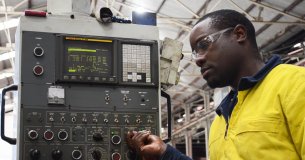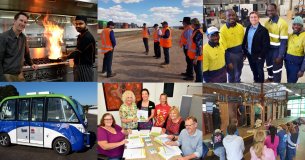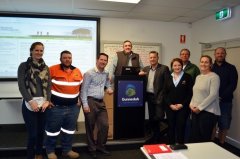-
Featured Items
-
Featured Resources
 Funding & Grants
Don't miss out on funding opportunities. Stay informed with our up to date online listings and email notifications.
Read More
Funding & Grants
Don't miss out on funding opportunities. Stay informed with our up to date online listings and email notifications.
Read More
 Skilled Migration
Our services help both applicants and employers, to learn more, develop plans, submit applications, and settle in.
Read More
Skilled Migration
Our services help both applicants and employers, to learn more, develop plans, submit applications, and settle in.
Read More
 Research and Analysis
Good research and analysis makes the case. How can our resources and services help your project or application?
Read More
Research and Analysis
Good research and analysis makes the case. How can our resources and services help your project or application?
Read More
 Information & Data Resources
With resources like REMPLAN, Regional Knowledge Base, and decades of data, discover how we can help your project.
Read More
Information & Data Resources
With resources like REMPLAN, Regional Knowledge Base, and decades of data, discover how we can help your project.
Read More
-
Stay InformedSubscribe to one or more of our regular email subscriptions, to be kept up to date on news and funding opportunities for the region
-
-
Our Region
- Our Region
- Regional Plan
- Regional Data
- Current Regional Issues
- Population Migration Analysis for 2016-21
- Job Vacancies Continue at All-Time High
- National Debt - What it Means for Our Economy?
- The True Value of Home Solar
- The Economic Impacts of Local Government Amalgamations
- State of the Regions Report 2014-15
- Antifragility - A different take on regional economic development
- Biohubs - Collaborative Waste Management
- Attracting New Residents
- Socio-Economic Impacts of the Murray Darling Basin Plan
- Murray Darling Basin Water Recovery
- Growing Businesses
- The Northern Inland Economy
- Geographical Overview
- Major Industry Sections
- Our Services
- Grants and Funding
-
Skilled Migration
- Skilled Migration
- Skilled Employer Sponsored Regional Visa
- Skilled Work Regional Visa (subclass 491)
- Temporary Seasonal Workers
- Designated Area Migration Agreement (DAMA)
- Helpful Information for Visa Holders
- Information for Employers
- Case Studies
- Payment Details
- Advice & Further Information
- Contact Details
- News & Events
-
Our Projects
- Our Projects
- Current Projects
- Skilled Migration
- Wool Works - Wool Training Schools
- Metal Works - Welding and Fabrication Schools
- Come On Inland
- Stories of Resilience
- Alt Brothers Beekeeping - Glen Innes
- Carelle's Toy Store - Glen Innes
- Greenhill Orchards - Arding
- Gwydir Meats - Warialda
- Kaputar Motors - Narrabri
- Moonbi General Store - Moonbi
- Sandstock - Tingha
- Sherelle Fashions - Tenterfield
- Sleepy Merino - Inverell
- Tenterfield Chamber of Toursim, Industry and Business - Tenterfeild
- The Welders Dog - Armidale
- Walcha Veterinary Supplies - Walcha
- AGCAP - Agribusiness Careers & Professions
- Northern Inland Regional Investment Profile
- Past Projects
- Digital Economy Strategy
- Business Growth Project
- Go Digital
- How to Start an Online Business
- Create Your Website Using Squarespace
- How to Edit Your Squarespace Site - Part 1
- How to Edit Your Squarespace Site Part 2
- Add a Shop to Your Squarespace Site
- Start a Blog and Find out What Customers are Searching
- 14 Tips For a Better Blog Post
- Which Social Media Platforms are Best for Your Business
- How to Use Facebook Effectively For Your Business – Part 1
- How to Use Facebook Effectively For Your Business – Part 2
- Instagram Tips for Business
- Catching Up, More Instagram & Dealing with Haters
- Getting Started with Twitter for Business
- Social Media Scheduling Tools
- How to Start an Etsy Shop – Part 1 – Research
- How to Start an Etsy Shop – Part 2 – Signup
- Online Security for Your Business
- Product Photography and Website Images: Your Guide
- 5 Tips to Improve your Productivity in your Business
- Best Online Business Resources
- How to Improve Your Communication Skills and Win More Clients
- NBN Coordinator
- Putting Power Back in the Regions
- Road Freight Study
- Town Audit Benchmarks
- Food and Wine
- Youth Survey
- Digital TV Switchover Assistance
- Northern Inland Transport Guide
- Live.Train.Work
- Northern Inland Innovation Awards
- Northern Inland Innovation Awards - 2017
- Northern Inland Innovation Awards - 2016
- Northern Inland Innovation Awards - 2015
- Northern Inland Innovation Awards - 2014
- Northern Inland Innovation Awards - 2013
- Northern Inland Innovation Awards - 2012
- Norther Inland Innovation Awards - 2011
- Prime Super Northern Inland Innovation Awards - 2010
- Prime Super Northern Inland Innovation Awards - 2009
- Northern Inland Innovation Awards - 2007
- Northern Lights Project
- NBN Smart Home
- Murray Darling Basin
- Moree Plains Business Workshops
- Namoi Investment Prospectus
- Industrial Land
- Bioenergy and Local Electricity Retailing
- Northern Inland Business Energy Assessment
- Skills for the Future
- Impacts of COVID-19 on Businesses
- Past Projects of NIRDB
- Aboriginal Employment and Enterprise in the Gunnedah Region
- Art as an Industry
- Aviation Survey
- Farm Forestry - Northern Inland Forestry Investment Group
- New England North West Film Strategy
- Northern Inland Excellence in Business Awards
- Food and Wine 2003 - 2008
- Prime Super Northern Inland Innovation Awards 2009
- Regional Business Networking Program
- Regional Leadership Course 2008
- Viticulture Strategy 2002-2003
- About Us
- Contact Us
- Other Resources
- Privacy and Legal
- Search
- News & EventsNews & Events
- NewsNews
- Getting Skilled Migrants to Where They’re NeededGetting Skilled…
Back to News Items
Getting Skilled Migrants to Where They’re Needed
Tuesday 24th of September 2019
Skill shortages continue to impact our region, impeding economic growth and service delivery and although Skilled Migration is not a complete solution, it is an important way in which we are upskilling our region. The program brings quality people, with top qualifications and experience here to our region to fill skill shortages and drive population growth as they establish their lives along with their families in our communities.
Over the coming months, our Senior Skilled Migration & Project Officer Gary Fry will be getting out to communities throughout the region to improve awareness of the skilled migrants we attract and how employers can connect with them. Our skilled migrants have made a considerable contribution to the Tamworth economy but we would like to see a greater proportion of them employed in our skill shortage hot spots, like Gunnedah, Narrabri and Moree.
On the invitation of Gunnedah Shire Council’s Economy Development Manager Charlotte Hoddle, Gary recently visited the Council Chambers Training Room, where he addressed the Gunnedah Economic Development Working Group and also met with President of the Gunnedah Chamber of Commerce Stacey Cooke McAllan. It was a good opportunity to connect with the broad range of Council and business community representatives who make up the Working Group, which is Chaired by Gunnedah Shire Mayor Cr. Jamie Chaffey.
Mayor Chaffey called on other community and business representatives to contribute to the skills shortage conversation, towards constructive action on local and regional levels. “It is critical that Chambers of Commerce, professional and training organisations and councils in each local government area are part of the conversation to identify the skills needed for each region. There is a place for skilled migration to those necessary qualified positions that have proven difficult to fill and are a roadblock to providing vital services in regional communities,” he said. “We need to welcome qualified people from other nations who can add great value to our social, cultural and – importantly - our economic futures.”
Gary encouraged the input from Gunnedah. “Both the Economic Development Working Group and the Chamber of Commerce were welcoming and attentive as I gave a quick but comprehensive overview of our Skilled Regional State Nominated visa program and the changes it is undergoing. The Skilled Regional State Nominated visa is a Permanent Residency (PR) pathway, so high-level requirements must be met for eligibility. Recipients (of the 489 visa) have had to live regionally for 24 months and work full-time hours regionally for 12 months to be able to apply for a PR visa, with their temporary work visa having a four year duration. The new visa 491 will be extended to five years, with three years of conditions to meet before PR eligibility.”
“The skilled migrants we attract to this region have no safety net; there is no welfare or Medicare for them. It is so important for them and any employer struggling to find the skilled workers they need that we help raise awareness about how they can connect.”
“One industry that has been a clear-cut beneficiary of our skilled migration program has been the aged-care sector. Resident aged-care facilities are required to have Registered Nurses on duty. Due to a skill shortage in the field, that requirement would have caused an aged-care crisis, if not for skilled migration. Other industries we have attracted skilled migrants for have included hospitality, metal and timber trades.”
Employers and groups like Gunnedah’s Economic Development Working Group are also encouraged to get into contact with Gary about skill shortages, as this helps to keep our regional occupation list responsive to local labour market trends.
Gunnedah was the first of a number of visits around the region that are planned before the end of the year to engage with community representatives and directly with employers. The next information sessions will be at the Narrabri and District Chamber of Commerce meeting on the 10th of October and in Tamworth on the 19th of October. For further details, contact Gary on gfry@rdani.org.au or 6771 0700.
Related Pages







 Latest News
Latest News

